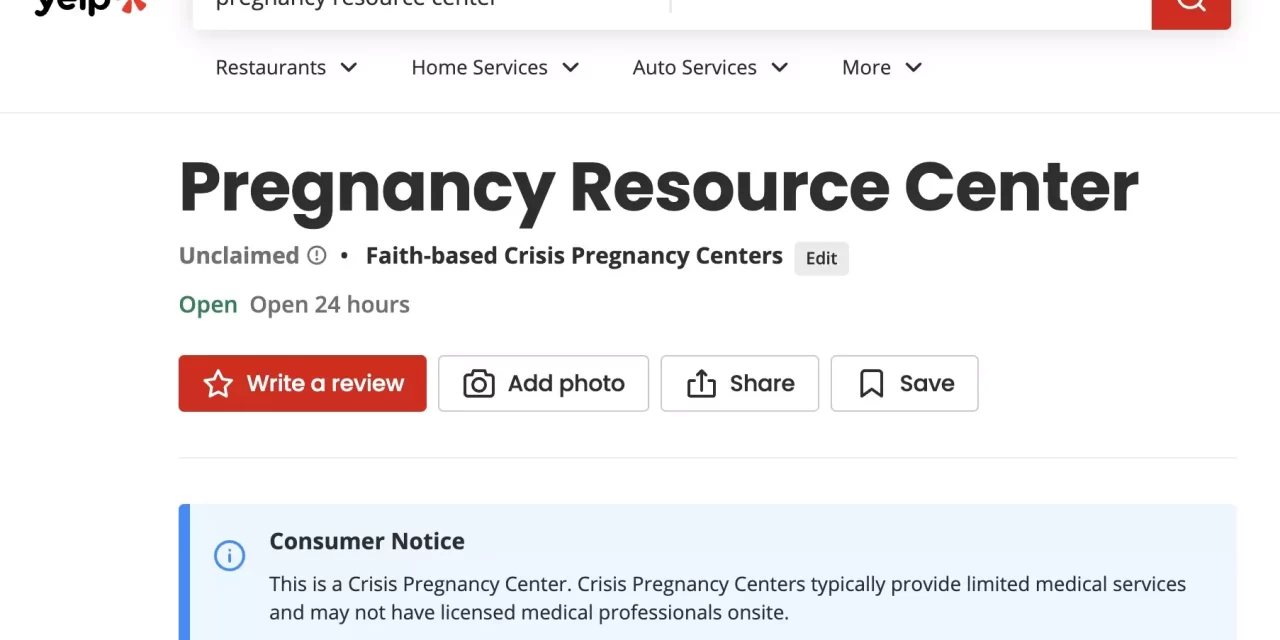NASHVILLE, Tenn. (BP) – The Ethics & Religious Liberty Commission expressed its objections Thursday, Sept. 1, to a new policy by the website Yelp that the Southern Baptist entity said casts doubt on the medical qualifications of pregnancy resource centers.
Yelp, a platform that enables consumers to find and review local businesses, announced Aug. 23 it would add a “consumer notice” for pro-life pregnancy resource centers (PRCs) to differentiate them from abortion clinics. Yelp’s new “consumer notice” says: “This is a Crisis Pregnancy Center. Crisis Pregnancy Centers typically provide limited medical services and may not have licensed medical professionals onsite.”
The announcement came nearly two months after the U.S. Supreme Court returned abortion regulation to the states by reversing the 1973 Roe v. Wade decision that legalized abortion throughout the country.
ERLC Acting President Brent Leatherwood said in a letter to Jeremy Stoppelman, chief executive officer of Yelp Inc., the company’s new policy limits “the options of women through your use of one-sided and misleading labeling.”
A “thorough review” would demonstrate many PRCs have medical professionals on staff and “offer legitimate, quality, holistic care for women and children in need that exceeds anything offered by most abortion clinics,” Leatherwood wrote. “This new label brings unnecessary doubt and will steer women away from receiving the information, care, supplies, and support that these centers offer, often at no cost.”
Hope Resource Center in Knoxville, Tenn., is among the PRCs “currently inaccurately designated” by Yelp’s “crisis pregnancy center” label, he told Stoppelman. Leatherwood cited Hope Resource Center’s employment of seven medical professionals and its provision of free pregnancy testing, ultrasound imaging, well-woman exams and pap testing among its services.
Hope employs three nurse practitioners and four registered nurses, with at least three licensed medical professionals in the building daily, the center’s executive director, Andrew Wood, told Baptist Press. The center also has five doctors and four obstetricians/gynecologists on its medical executive committee, Wood said. The physicians serve on a monthly rotation that enables them to be available as needed, he told BP.
In his letter, Leatherwood acknowledged not all PRCs have as much to offer as Hope Resource Center, but “it is misleading to imply that all pregnancy centers do no or may not provide authentic medical care by trained professionals.”
“A consistent application of this labeling process must also include identifying abortion clinics that operate without medical licensing or hospital admitting privileges and offer only abortion services,” he wrote. “If Yelp is seeking transparency and honesty in their listings, those values must be applied consistently and fairly to all.”
In an email interview with BP, Wood described Yelp’s new policy as “another attempt in a long line of attempts to malign and mischaracterize the great work that happens in pregnancy centers across the country.”
“These ‘consumer notices’ tags are designed to create confusion and to question the credibility” of centers such as Hope, Wood said. “We have made a concerted effort since our founding in 1997 to operate above board, build relationships in our community and to provide expert medical care to women in Knoxville. We have also intentionally fostered relationships with the medical community in Knoxville over the past 25 years, and these unfounded ‘notices’ from Yelp seek to undermine that great work.
“This undermining will only hinder women in our community from reaching the help they so desperately need,” he said. “Yelp is now doing that which it claims to abhor as they are willfully providing misinformation.”
In his letter, Leatherwood said Yelp’s new policy regarding PRCs fails to fulfill the company’s desire “to provide ‘reliable’ and ‘useful’ information to its users. Not only is your company misleading women about these clinics, it also remains silent about the grisly realities of abortion facilities.”
He told Stoppelman the ERLC would welcome the opportunity to provide input regarding a better approach to the issue.
Wood said, “We knew that the digital landscape, post-Roe, would not be friendly to life-affirming organizations, and we are currently working through strategies moving forward as we navigate this new post-Roe digital reality.”
A check of Yelp Wednesday (Aug. 31) showed its new “consumer notice” was included on the platform for 28 of 37 PRCs that have received donations of ultrasound machines through the Psalm 139 Project since December 2020. The Psalm 139 Project is the ERLC’s ministry to help provide ultrasound technology to pregnancy centers and train staff members in its use.
The ERLC has secured the funding and identified the recipient centers to reach its goal of 50 ultrasound placements from December 2020 to January 2023, which would have been the 50th anniversary of the Roe ruling had it not been overturned. When the ERLC reaches its goal, Psalm 139 will have helped place ultrasound equipment at centers in 22 states and one country, Northern Ireland, since 2004.
Jason Thacker, the ERLC’s chair of research in technology ethics, called for a correction in Yelp’s “(mis)labeling of pregnancy resource centers” in an Aug. 29 post on the entity’s website. He described the “consumer notice” as “one-sided and meant to ensure easy access to abortion while introducing friction for obtaining life-saving information and services.”
In contrast to Yelp’s new policy, Thacker said Google’s policy explained in an Aug. 25 letter to members of Congress “is better suited than overly broad labels utilized by Yelp that introduce doubt and confusion rather than provide accurate information.” Google said it labels centers as providing abortions or not providing abortions.
In announcing Yelp’s new policy Aug. 23, Noorie Malik, the company’s vice president of user operations, wrote, “With this new consumer notice we’re aiming to further protect consumers from the potential of being misled or confused.” She also said the company has a “consistent track record” of support for accessing “reproductive healthcare” for its employees and users.




